-
 Art of Wellness Acupuncture & Traditional Chinese Medicine (TCM)11704 Wilshire Blvd, Suite 295, Los Angeles, CA, 90025
Art of Wellness Acupuncture & Traditional Chinese Medicine (TCM)11704 Wilshire Blvd, Suite 295, Los Angeles, CA, 90025
myartofwellness@gmail.com310-451-5522 Office Hours
MonClosedTue7:30 am --4 pmWed7:30 am --4 pmThu7:30 am -- 4 pmFri7:30 am -- 4 pmSat7:30 am -- 4 pmSunClosedOur office opens from Tuesdays to Saturdays 7:30 am to 4 pm, will be closed on Memorial day, Independent day, Labor day, Thanksgiving day, Christmas and New year.
-
Recent Posts
- How to Treat De Quervain’s Tenosynovitis With Acupuncture and TCM
- Chinese New Year 2026: Year of the Horse
- Acupuncture and TCM Treatment for Perimenopause Symptoms
- How to Treat Insulin Resistance With Acupuncture and TCM
- How to Treat Metabolic Syndrome With Acupuncture and TCM
- How to Treat Syncope With Acupuncture and TCM
- How to Treat Thoracic Outlet Syndrome With Acupuncture and TCM
- How to Treat Dupuytren’s Contracture With Acupuncture and TCM
- How to Treat Nutcracker Syndrome With Acupuncture and TCM
- How to Treat Rosacea With Acupuncture and TCM
- How to Treat Perioral Dermatitis With Acupuncture and TCM
- Lymphatic Drainage With Acupuncture and TCM
- How to Treat Turf Toe With Acupuncture
- How to Treat Nerve Pain With Acupuncture and TCM
- How to Treat Watery Eyes With Acupuncture and TCM
- How to Treat Ovarian Cysts With Acupuncture and TCM
- Sign up to receive news and updates and get my free report:“The Top 10 Reasons to Try Acupuncture”

December 2025 M T W T F S S 1 2 3 4 5 6 7 8 9 10 11 12 13 14 15 16 17 18 19 20 21 22 23 24 25 26 27 28 29 30 31
Inflammation
How to Treat Scleroderma With Acupuncture and TCM
By Xiaomei Cai, L.Ac., Ph.D. and Qineng Tan, L.Ac., Ph.D.
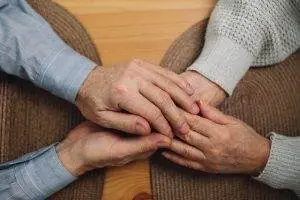
Hard, thickening, tight skin? Itchy, dry skin that is shiny? Changing skin color? These could be symptoms of scleroderma, an autoimmune disorder that causes your body to produce too much collagen. Acupuncture and TCM treatment can help relieve inflammation and pain while helping to resolve the underlying cause of scleroderma.
Scleroderma can be considered a type of dermatosis (skin lesion), and also a type of connective tissue disease (negatively impacting tissues that connect structures in the body), as it usually affects skin and cartilage, often starting in the extremities, and then extending up the limbs towards the trunk.
Collagen is a form of fibrous protein that the body produces to maintain the structure of skin cells, muscles, bones, and connective tissue. The immune system triggers collagen production when we are injured, but in the case of scleroderma, the body is overproducing and accumulating too much collagen.
Localized scleroderma affects primarily the skin tissue, but can also spread to subcutaneous tissues, like fascia and muscles.
In some cases, scleroderma can also impact internal organs, like the esophagus, lungs, heart, and kidneys. This is known as systemic scleroderma.
Top 3 Types of Scleroderma
Localized scleroderma can be differentiated into 3 types:
- Localized scleroderma – a few patches of discolored skin (circumscribed morphea); these skin lesions can vary in size, may be oval shaped, and are usually yellow in the center with a red border.
- Generalized scleroderma – also called generalized morphea, with this type there are more patches of thick, hard skin on various parts of the body, which may overlap.
- Linear scleroderma – more common in children, may show up as one band of affected skin on a limb or on the trunk, with a few patches of morphea. Linear scleroderma on arms and legs may affect the growth and development of that limb, as scleroderma may impact the muscle and bone tissues as well as the skin.
Systemic scleroderma is rare, but happens more commonly in women between the ages of 30 and 50. This type of scleroderma can manifest in different ways.
Systemic scleroderma can sometimes first show up as Raynaud’s phenomenon, or Raynaud’s syndrome, in which the blood vessels in the hands and feet close up when the weather is cold and cause color changes to the skin, as well as sensations of numbness, prickling, tingling, or pain. Stress can also trigger Raynaud’s.
Systemic scleroderma can cause scarring on the skin and internal organs, which can lead to gastrointestinal problems like acid reflux, cardiovascular and pulmonary problems, or renal disease.
Acupuncture treatment can be used as an adjunct treatment to help relieve symptoms of pain related to skin hardening, as well as helping to alleviate heartburn and GERD type symptoms in patients with esophageal symptoms of scleroderma. TCM can also help address the root causes of scleroderma and other autoimmune disorders.
What Causes Scleroderma?
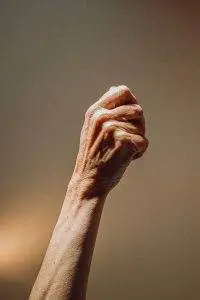
As with most autoimmune disorders, medical science has not yet discovered exactly why some people develop this condition. While it is not passed from parent to child the way genetic diseases are, you are more likely to have scleroderma if someone else in your immediate family has it, too.
It is believed that factors like environmental toxins and/or viral infections can trigger scleroderma symptoms to flare up. The overproduction of collagen is due to abnormal functioning of the immune system.
Because women develop scleroderma more often than men do, it may be that there is a hormonal factor that affects the disease, as well.
Diagnosis and Medical Treatment for Scleroderma
There is no cure for scleroderma, so conventional medical treatments aim to alleviate symptoms and slow down the progression of the disease. The treatment plan may vary depending on the specific manifestations and severity of the disease.
To diagnose scleroderma, doctors rely on a combination of clinical assessments, medical history review, physical examinations, and lab tests. A doctor will first observe skin changes, such as thickening and hardening, then look for internal organ involvement and other symptoms.
Blood tests can help identify specific antibodies associated with scleroderma, such as antinuclear antibodies (ANA), anti-centromere antibodies (ACA), and anti-Scl-70 (anti-topoisomerase I) antibodies. Additionally, blood tests can assess organ function, including kidney and liver function, as well as inflammatory markers.
X-rays, ultrasound, or CT scans may be used to evaluate internal organ involvement, such as lung fibrosis, gastrointestinal complications, and cardiac abnormalities.
A skin biopsy sample may be taken to confirm the presence of fibrosis and assess the degree of inflammation.

Medications that may be recommended for treating scleroderma symptoms include:
- Immunosuppressants: Medications such as methotrexate, mycophenolate mofetil, and azathioprine may be prescribed to suppress the immune response and reduce inflammation.
- Corticosteroids: Oral or topical corticosteroids can help manage inflammation and alleviate symptoms in certain cases. However, long-term use may have potential side effects and is usually minimized.
- Vasodilators: Medications like calcium channel blockers and prostacyclin analogs may be prescribed to improve blood flow and manage Raynaud’s phenomenon.
- Proton pump inhibitors (PPIs): These medications can help manage gastroesophageal reflux disease (GERD) symptoms, which are common in scleroderma patients.
Patients are often advised to make lifestyle changes to manage their condition effectively. These may include:using skin moisturizers and avoiding excessive sun exposure, and using sunscreen with a high SPF, avoiding cold temperatures and stress to prevent triggering Raynaud’s, quitting smoking, and eating an anti-inflammatory diet.
Can Acupuncture Help Scleroderma?
TCM treatment for scleroderma focuses more on addressing the underlying causes of the condition, rather than simply trying to relieve symptoms. An acupuncturist will look closely at the whole person, listen carefully to hear all the symptoms they are experiencing, even those which may seem unrelated, feel their pulse and make other observations, and then ascertain which diagnostic pattern may apply.
According to TCM theory, scleroderma symptoms may occur due to:
- Blood stagnation
- Yang deficiency
- Kidney Qi deficiency or yang deficiency
- Liver and Gallbladder damp heat
- Liver blood deficiency
- Liver win
- Spleen yang deficiency
- Stagnation of cold, wind, and/or damp
Depending on the diagnosis, the TCM practitioner will then plan a treatment protocol to address the root cause, using acupuncture and herbs. For example, herbs can help move stagnant blood, relieving the skin conditions related to scleroderma. Herbs can even help to inhibit collagen production, to help reduce skin hardening.
Acupuncture has been shown to help reduce the number of Raynaud’s attacks.
Moxibustion treatment may also be used to help relieve symptoms related to Raynaud’s phenomenon.
The use of acupuncture for stress relief is also integral to treatment for scleroderma, as stress can trigger a worsening of symptoms.
Acupuncture can help reduce esophageal reflux in cases where esophageal strictures have developed due to scleroderma in the digestive tract and help improve kidney function when kidneys have been impacted by fibrosis.
TCM herbal formulations for scleroderma will be individualized for each patient’s needs. Herbs may be used to help warm and nourish the organs, while clearing dampness and activating stagnant blood and Qi.
Acupuncture Near Me for Scleroderma in Los Angeles
Acupuncture and TCM herbal medicine can be excellent modalities for helping with difficult to treat skin conditions, connective tissue disorders, and autoimmune disorders, including:
- Dermatitis
- Eczema
- Psoriasis
- Vitiligo
- Rheumatoid Arthritis
- Lupus
- Herpes simplex
- Hives, urticaria
- Ehlers-Danlos syndrome (EDS)
If you are experiencing painful skin problems or digestive problems, consider seeking out alternative care in addition to conventional treatments.
*This article is for education from the perspective of Traditional Chinese Medicine only. The education provided by this article is not approved by FDA to diagnose, prevent, treat and cure human diseases. It should not stop you from consulting with your physician for your medical conditions. Traditional Chinese Medicine is based on Qi, which is an invisible force that usually cannot be observed by modern science. Because science focuses on testing ideas about the natural world with evidence obtained through observation, these aspects of acupuncture can’t be studied by science. Therefore acupuncture and Chinese herbs are often not supported by double-blind, randomized trials, and they are considered alternative medicine therapies in the United States.
How to Treat CRPS With Acupuncture and TCM
By Qineng Tan, L.Ac., Ph.D. and Xiaomei Cai, L.Ac., Ph.D.
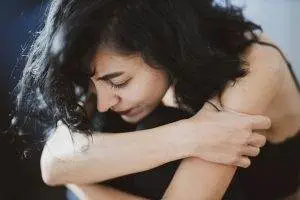
Chronic pain, changes in skin temperature, and swelling in a specific limb or body part? Pain, swollen limbs, edema and inflammation after a seemingly minor injury? These could be signs of a condition known as Complex Regional Pain Syndrome (CRPS). Acupuncture and TCM can help relieve chronic pain due to CRPS.
CRPS is a relatively rare condition that usually causes pain and inflammation in an arm or leg. It most often occurs after someone experiences an injury to a limb, or has surgery on one of their limbs. The painful area may be swollen, turn red and hot sometimes, and blue and cold at other times.
CRPS is marked by pain that seems disproportionate to the injury or outside stimulus. For example, a person with CRPS may feel severe pain when the affected area is touched lightly, or when a breeze blows. While CRPS is not fully understood by medical science, it is generally considered to be a neurological disorder.
While most cases of CRPS do improve in the long run, there may be a long period of time during which the injured area seems to be getting more inflamed.
CRPS pain may worsen and spread to involve more of the affected limb. In some cases, the pain may even be “mirrored” in the opposite limb. This is partially why CRPS is theorized to be caused by problems with the nervous system.
Sometimes CRPS manifests without any evidence of nerve damage. This condition is known as CRPS-I, or Reflex Sympathetic Dystrophy Syndrome. (RSD or RSDS).
Some cases of CRPS can be associated with proven nerve damage; this is called “causalgia,” or CRPS-II.
Conventional Western medicine approaches primarily focus on managing symptoms with pain medications and physical therapy. In some cases, CRPS pain can be so severe that it causes disability, as the person cannot use their limb normally in daily activities.
Traditional Chinese Medicine (TCM) and acupuncture can help address the root causes of CRPS. Acupuncture and TCM offer a holistic approach to relieve pain and enhance overall well-being.
Top 5 Symptoms of Complex Regional Pain Syndrome (CRPS)

CRPS symptoms can change. A CRPS flare up may last days or weeks, when pain and swelling get worse. Sometimes, the pain may seem to come out of nowhere; other times, it may be triggered by exertion, stress, or other factors.
- Intense and prolonged pain: Individuals with CRPS experience severe and persistent pain that may seem disproportionate to the initial injury or cause. There may be “pins and needles” or a burning sensation. Light contact with something may cause severe pain; this phenomenon is known as “allodynia.” Or something that would usually cause mild pain, like a pin prick, causes severed pain; this is called “hyperalgesia.”
- Changes in skin temperature and color: The affected area may become warmer or cooler compared to the surrounding areas, and skin may appear blotchy, pale, red, or blue or gray.
- Swelling and sensitivity: Swelling, edema, and increased sensitivity to touch or even a slight breeze are common symptoms of CRPS.
- Limited range of motion: Stiffness, muscle weakness, and difficulty moving the affected limb or body part may occur. There may be tremors or jerky motions of the limb.
- Changes in skin texture, hair and nail growth: Abnormal hair and nail growth patterns, such as excessive hair growth or brittle nails, may develop in the affected area. The skin may become thinner or thicker, or may be shiny or scaly.
CRPS may cause unusually heavy sweating in the affected area, or cause there to be a total absence of sweating in the area.
Medical Treatment for CRPS
In the realm of conventional medicine, Complex Regional Pain Syndrome (CRPS) is understood as a multifaceted condition that often arises following an injury or trauma to a limb or body part. While the exact cause of CRPS is not fully understood, it is believed to involve abnormal responses of the central and peripheral nervous systems. Nerve damage, inflammation, and changes in blood flow are thought to play a role in the development of CRPS.
Certain risk factors may increase an individual’s susceptibility to the condition, such as a history of fractures, surgery, or repetitive motion injuries. Additionally, psychological factors and genetic predisposition may contribute to the development of CRPS.
CRPS can be triggered by a variety of factors, including surgery, immobilization, infections, emotional stress and trauma.
Diagnostic testing for CRPS may include a bone scan, x-rays, MRI, and a sweat production test.
Medications recommended may include pain relievers, corticosteroids to help bring down inflammation, and nerve blocking injections. Low doses of ketamine are sometimes used to help relieve pain. Topical analgesics may help reduce sensitivity in the affected area, as may heat therapy.
Other therapies for CRPS may include biofeedback and transcutaneous electrical nerve stimulation (TENS). Mirror therapy, in which a person stands or sits in front of a mirror set-up that tricks the brain into thinking it sees the injured limb working the way the healthy limb does, can be helpful for retraining the nervous system.
Acupuncture treatment for CRPS can work on multiple levels to help relieve pain, improve motor function, reduce inflammation, help heal nerves, and reduce stress.
Can Acupuncture Help CRPS?
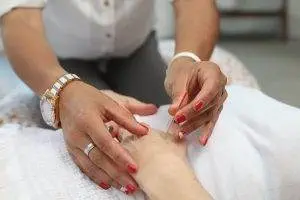
In Traditional Chinese Medicine (TCM), Complex Regional Pain Syndrome (CRPS) is understood as a disruption in the flow of Qi (energy) and Blood in the affected area, leading to pain and dysfunction. According to TCM theory, the underlying causes of CRPS are often related to the stagnation of Qi and Blood, as well as the blockage of meridians (energy channels) that run through the affected limb or body part. TCM treatments aim to restore the smooth flow of Qi and Blood, harmonize the body’s internal balance, and alleviate pain.
Acupuncture, a key component of TCM, is believed to stimulate specific acupoints along the meridians, helping to regulate the nervous system’s response and promote healing. Chinese herbal medicine is also commonly used in TCM to support the treatment of CRPS by addressing underlying imbalances and promoting overall well being. By addressing both the physical and energetic aspects of the condition, TCM aims to restore harmony and alleviate pain in individuals with CRPS.
One study looked at two soldiers whose upper extremities were injured in combat and were later diagnosed with CRPS. When conventional methods did not help relieve pain, they were given one or two acupuncture treatments per week for a few weeks. They had 80% improvement in pain and functionality and with no recurrence at a 20-month follow up.
An individual case study of a 34-year-old with CRPS showed improvement in pain and emotional well-being after a series of acupuncture treatments.
When dealing with Complex Regional Pain Syndrome (CRPS), incorporating certain lifestyle changes, behavioral adjustments, dietary modifications, and home remedies can be beneficial in managing the condition. Here are some recommendations:
Stress Management: Practicing stress-reducing techniques such as deep breathing exercises, meditation, and mindfulness can help alleviate CRPS symptoms. Stress management techniques promote relaxation and can positively impact pain perception.
- Gentle Exercise: Engaging in low-impact exercises like walking, swimming, or yoga can help improve blood circulation, maintain joint flexibility, and reduce muscle stiffness. It is important to consult with a healthcare professional or physical therapist to determine the most appropriate exercise program for your specific situation.
- Heat and Cold Therapy: Applying heat packs or cold compresses to the affected area may provide temporary relief from pain and inflammation. Experiment with both methods to see which works best for you. Remember to protect your skin and avoid extreme temperatures.
- Balanced Diet: Maintaining a healthy and well-balanced diet is crucial for overall well-being. Include nutrient-rich foods such as fruits, vegetables, whole grains, lean proteins, and healthy fats. Avoid excessive consumption of processed foods, refined sugars, and caffeine, as they may contribute to inflammation and worsen symptoms.
- Adequate Hydration: Staying hydrated is important for promoting optimal bodily function and supporting overall health. Aim to drink an adequate amount of water throughout the day to keep your body hydrated and support proper circulation.
- Stress Reduction: CRPS symptoms can be exacerbated by stress. Engaging in activities that promote relaxation, such as hobbies, listening to soothing music, spending time in nature, or engaging in creative outlets, can help reduce stress levels and improve overall well-being.
- Sleep Hygiene: Getting sufficient and quality sleep is essential for managing chronic pain conditions. Establish a regular sleep routine, create a comfortable sleep environment, and practice good sleep hygiene habits like avoiding electronic devices before bed.
It’s important to note that these lifestyle changes, behavioral adjustments, dietary modifications, and home remedies should complement your comprehensive treatment plan and be tailored to your individual needs. Consult with a healthcare professional or a qualified practitioner of Traditional Chinese Medicine (TCM) for personalized guidance and recommendations based on your specific condition and symptoms.
Acupuncture Near Me for CRPS in Los Angeles and Santa Monica
At Art of Wellness Acupuncture in West L.A., we have over 35 years of experience treating neurological conditions and chronic pain of all kinds. Acupuncture is a modality that is particularly suited to treating conditions like CRPS, where it may be difficult to find relief through conventional treatment methods. If you are experiencing excessive pain in one of your limbs, with temperature sensitivity and inflammation, it may be worth seeking out alternative treatment with TCM.
*This article is for education from the perspective of Traditional Chinese Medicine only. The education provided by this article is not approved by FDA to diagnose, prevent, treat and cure human diseases. It should not stop you from consulting with your physician for your medical conditions. Traditional Chinese Medicine is based on Qi, which is an invisible force that usually cannot be observed by modern science. Because science focuses on testing ideas about the natural world with evidence obtained through observation, these aspects of acupuncture can’t be studied by science. Therefore acupuncture and Chinese herbs are often not supported by double-blind, randomized trials, and they are considered alternative medicine therapies in the United States.
How to Treat Stomach Ulcer With Acupuncture and TCM
By Qineng Tan, L.Ac., Ph.D. and Xiaomei Cai, L.Ac, Ph.D.
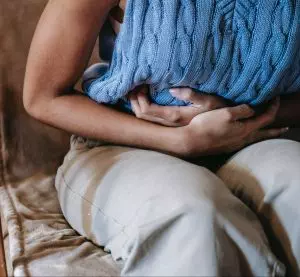
Burning sensation in your stomach? Persistent abdominal pain? Frequent heartburn and indigestion? These could be stomach ulcer symptoms. Acupuncture and TCM can help alleviate ulcer symptoms and reduce inflammation.
Stomach ulcers, also known as peptic ulcers, are painful sores that develop in the lining of the stomach or the upper part of the small intestine. Acid that is naturally present in the digestive tract begins to eat away at the lining of the stomach or intestinal walls. This can cause discomfort, burning pain, and other symptoms that significantly impact a person’s quality of life.
Peptic ulcers may lead to complications if left untreated. In these cases, we may refer to the condition as peptic ulcer disease (PUD).
If the ulcer is near a blood vessel, it can cause internal bleeding. In severe cases, an ulcer can burn through the wall of the stomach, which leads to undigested food and digestive juice leaking out into the abdominal cavity. This is known as a “perforated ulcer” and often requires immediate surgery.
A peptic ulcer can also be so inflamed that it blocks food from moving through the digestive tract, which can cause you to feel full quickly, regurgitate food, and lose weight unintentionally. This is known as “obstruction.”
Ulcers are typically treated with medications and, in more severe cases, surgery. Acupuncture treatment can be used as an alternative or adjunct treatment to help heal ulcers, with or without surgery.
What Causes Stomach Ulcers?
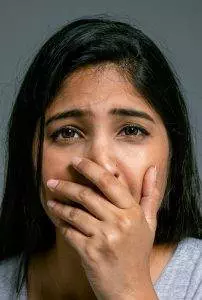
Stomach ulcers are often caused by an imbalance between the digestive fluids and the protective mechanisms of the stomach lining. There is usually a lining of mucus that helps protect the stomach from digestive fluids, but sometimes there is too little mucus and too much acid.
A bacterial infection with the Helicobacter pylori bacteria is often involved in the formation of an ulcer. This bacteria can cause inflammation that affects the stomach lining. Left untreated, an H. pylori infection in the digestive tract can increase your risk for certain types of gastric cancers.
Canker sores, also known as mouth ulcers or aphthous ulcers, can also be caused by the H. pylori bacterial infection. Canker sores can also be related to other gastrointestinal disorders, like Crohn’s disease, or inflammatory bowel disease (colitis).
A rare condition called Zollinger-Ellison Syndrome (ZES), in which a tumor called a gastrinoma develops in the pancreas or top part of the small intestine, can cause excessive amounts of stomach acids to be produced, which can lead to the formation of ulcers.
Long-term use of nonsteroidal anti-inflammatory drugs or pain medication (NSAIDs), like Ibuprofen can also cause inflammation in the stomach.
Lifestyle habits like smoking, drinking too much alcohol, or eating a lot of spicy foods irritate the stomach lining and contribute to the development of ulcers.
Emotional and/or physiological stress can throw off the body’s pH balance, which can also cause excessive stomach acids to be produced.
Top 5 Symptoms of Stomach Ulcers
While it is possible to have an ulcer and not be aware of it because you don’t have any symptoms, most people with ulcers will experience some pain in their stomach.
- Abdominal pain: A burning or gnawing pain in the abdomen, typically between the breastbone and the navel. The pain may be worse when the stomach is empty, such as between meals, and at night.
- Indigestion: Discomfort or bloating after eating, belching, and heartburn (acid reflux).
- Nausea and vomiting: Feeling nauseous and experiencing vomiting, especially after meals. Some people may even vomit blood.
- Loss of appetite: A decreased desire to eat due to feelings of fullness or discomfort.
- Blood in the stool: In severe cases, ulcers can lead to bleeding, resulting in blood in the stool or black, tarry stools.
Other ulcer symptoms can include: changes in appetite, intolerance to certain foods, especially fatty foods, feeling faint, having trouble breathing, and weight loss.
People may feel that the stomach pain is alleviated by eating certain foods that create a buffer against the stomach acid.
While medications and lifestyle changes are commonly used to treat peptic ulcer symptoms, acupuncture and Traditional Chinese Medicine (TCM) offer a holistic approach to address the root causes and alleviate symptoms of stomach ulcers.
Medical Treatment for Peptic Ulcers
When you seek conventional treatment for stomach ulcers, an endoscopy may be performed so that your doctor can see the ulcer(s) and possibly stop bleeding or remove abnormal tissue. Medications may be offered, and in some cases, surgery may be indicated.
Medications for stomach ulcer treatment include:
- Proton pump inhibitors (PPIs): These drugs reduce stomach acid production, allowing the ulcer to heal. PPIs include omeprazole, lansoprazole, and esomeprazole.
- Histamine receptor blockers (H2 blockers): These medications reduce acid production, providing relief and promoting ulcer healing. Famotidine and ranitidine are common H2 blockers.
- Antibiotics: If an H. pylori infection is present, a combination of antibiotics, such as amoxicillin and clarithromycin, will be prescribed to get rid of the bacteria.
Stomach ulcer surgery may be necessary if complications like perforation or obstruction occur.
Repairs to a stomach ulcer can be performed during an endoscopic procedure, where a camera and tools are introduced through the throat.
Minimally invasive laparoscopic surgery can be done through a small incision in the abdomen. Holes in the stomach may be patched with something called a Graham Patch.
If the hole is too large to be patched, then a small part of the stomach may be cut away, and the whole stomach will be closed, and, if necessary, reconnected to the top of the small intestine. This procedure is called a partial gastrectomy.
While conventional medical intervention for stomach ulcers can help bring relief, they do not necessarily prevent the recurrence of ulcers. Medications and surgery do not address the chronic stress that may have contributed to the formation of the ulcers in the first place.
Acupuncture treatment can help restore balance of the emotions as well as gastric fluids. It can also promote healing after ulcer surgery and prevent further occurrence of ulcers. If an ulcer is not yet so severe that surgery is needed, acupuncture treatment may be able to help heal the ulcer before it becomes worse.
Can Acupuncture Help Stomach Ulcers?
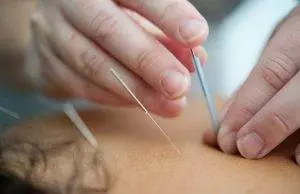
Acupuncture treatment for stomach ulcers, gastric pain, and also canker sores (mouth ulcers), is usually focused on harmonizing the Qi (life force energy) of the stomach and the spleen. Heat and dampness are pathogenic forces that can cause imbalance in the stomach and spleen, while heat and wind in the lungs can also be a factor, from the TCM theory perspective.
Therefore, acupuncture points will be chosen to help strengthen and regulate the stomach and spleen. Acupuncture has been shown to have an effect on the vagus nerve and help reduce overactive acid production in the stomach. Acupuncture also affects the central nervous system, with the effect of reducing pain sensations.
One study compared patients who received acupuncture treatment for peptic ulcers in addition to medication (bismuth subnitrate and amoxicillin) versus patients who received only medications. The patient who also had acupuncture had a higher recovery rate, clearing the H. pylori bacterial infections, and also had a dramatically reduced recurrence rate in the following year after treatment ended.
A laboratory study showed that acupuncture helped to repair ulcerated tissues, reduce the secretion of gastric acids, and improve the condition of gastric mucosa, or stomach lining.
Another study showed that acupuncture treatment for chronic gastritis—inflammation of the stomach lining—was more effective than a drug protocol consisting of proton pump inhibitors, NSAIDs, and antibiotics.
Acupuncture Near Me for Stomach Ulcer – Los Angeles Area
At Art of Wellness Acupuncture and Traditional Chinese Medicine in West L.A., we have over 35 years of experience helping people with gastrointestinal disorders of all kinds. Problems such as nausea, diarrhea, constipation, diverticulitis, colitis (IBD), IBS, and Crohn’s disease can all be relieved by using TCM as an alternative or complementary medicine treatment.
*This article is for education from the perspective of Traditional Chinese Medicine only. The education provided by this article is not approved by FDA to diagnose, prevent, treat and cure human diseases. It should not stop you from consulting with your physician for your medical conditions. Traditional Chinese Medicine is based on Qi, which is an invisible force that usually cannot be observed by modern science. Because science focuses on testing ideas about the natural world with evidence obtained through observation, these aspects of acupuncture can’t be studied by science. Therefore acupuncture and Chinese herbs are often not supported by double-blind, randomized trials, and they are considered alternative medicine therapies in the United States.
How to Treat Gallbladder Pain With Acupuncture and TCM
By Qineng Tan, L.Ac., Ph.D. and Xiaomei Cai, L.Ac., Ph.D.

Pain on right side abdomen? Sudden, sharp right abdomen pain? This could be a sign of a gallstone or gallbladder issue. Gallbladder attacks can cause severe gallbladder pain. Acupuncture and TCM can provide an alternative or adjunct treatment for gallstones symptoms.
The gallbladder is a small organ located on the right side of your abdomen, under the liver. The liver produces bile, a liquid that helps break down fats into fatty acids. The gallbladder stores bile and releases it into the small intestine as needed, to help with digestion.
When the bile that your body produces has too much cholesterol or bilirubin in it, or when bile is not draining out of the gallbladder properly, it can become too concentrated and begin to harden into a solid.
Gallbladder pain usually occurs because a person has gallstones, which are just what they sound like: little stones that develop inside the gallbladder and are made up mostly of cholesterol. The medical term for gallstones is “cholilithiasis.”
Many people have gallstones and are not aware of it. It is possible to have gallstones with no symptoms at all.
Top 5 Gallstone Symptoms
People who have gallbladder disease or gallstones are likely to experience a condition known as “biliary colic.” This means that they have an intolerance for fatty foods and may experience dyspepsia, nausea, and/or bloating when they eat something that disagrees with them.
Severe, sharp right side stomach pain is the most common sign of a gallbladder attack, which is when a gallstone becomes lodged in one of the small tubes or ducts that lead to and from the liver, gallbladder, and pancreas.
Gallbladder symptoms may include:
- Pain in lower right abdomen
- Nausea and/or vomiting
- Yellow skin and/or yellow eyes, jaundice
- Fever and/or chills
- Brown pee, brown urine, light-colored poop
Sometimes gallbladder pain can refer to the right shoulder, or between the shoulderblades.
Gallbladder pain can also happen due to inflammation of the gallbladder. This condition is known as cholecystitis and occurs when a gallstone blocks the duct that leads out of the bladder, causing bile and bacteria to build up and become infected.
Stones can sometimes become lodged in the common bile duct, which not only causes pain, but can lead to pancreatitis. Gallstones are the primary cause of acute pancreatitis, in which the pancreas becomes irritated and inflamed due to a backup of bile and/or digestive enzymes.
The pain of a gallbladder attack is unignorable. If it doesn’t go away within a few hours, most people choose to go to the emergency room for urgent care.
Gallstones may pass on their own, or drugs are sometimes used to help dissolve the gallstones. These drugs can be expensive, and sometimes cause problems like atherosclerosis, or fatty buildup in the arteries.
When gallstone pain comes and goes, and the gallstones are present but not causing the blockage of a duct, usually pain management and patience are the only treatment.
If gallbladder issues keep coming up, the typical medical treatment is gallbladder surgery.
Acupuncture can offer an alternative treatment to help relieve gallbladder pain. TCM is considered an effective treatment for biliary colic due to gallbladder disease.
Gallbladder Removal
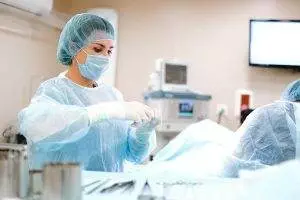
It is very common for people presenting with acute pancreatitis or a gallbladder attack to have a cholecystectomy, or gallbladder removal. Over 300,000 cholecystectomies are performed in the U.S. each year.
While this gallbladder surgery is usually done laparoscopically and is minimally invasive, there are disadvantages to living without a gallbladder.
Some people have what is known as postcholecystectomy syndrome, in which they continue to experience pain on right side abdomen, heartburn, nausea, indigestion, and vomiting, even though their gallbladder is gone.
Some research studies have suggested that gallbladder removal may not be necessary or desirable for everyone. It may be worth considering alternative or adjunct gallbladder pain treatment with TCM and acupuncture.
Can Acupuncture Help Gallbladder Symptoms?
Chinese medicine has been used to treat gallstones for thousands of years, without surgery.
According to TCM theory, the gallbladder is the Yang organ that ideally works cooperatively and in harmony with the Yin liver. The gallbladder is an extraordinary organ in that it is part of the digestive system, but it never comes in direct contact with the food you eat. It stores and secretes bile to help break down fats.
In TCM, we consider the gallbladder to represent the part of our nature that makes decisions, takes action, and feels inspired. When the liver and the gallbladder are not functioning smoothly, we may feel frustrated, angry, and depressed. Repressing anger can exacerbate gallbladder problems, as can eating the wrong foods.

In TCM, the gallbladder is associated with spring, and the wood element. It is best nourished with lots of dark, leafy greens, herbs, roots, and green tea. Eating too many fatty, fried foods, and drinking too much alcohol can have a very negative effect on both the liver and gallbladder.
The stimulation of acupoints along the gallbladder meridian can help to regulate the sphincters of the gallbladder and its action, and help to promote the secretion of bile so that it does not remain stagnant inside the gallbladder.
Acupuncture can also have an analgesic effect that may even be superior to that of NSAIDs pain relief medications, without any of the side effects that may occur with regular use of these drugs.
Acupuncture can also be used to treat chronic cholecystitis, the chronic inflammation of the gallbladder due to infection. TCM treatment can help reduce inflammation and improve immune function so that infections can be more easily fought off.
Acupuncture and TCM can also be used as an adjunct treatment to help boost the efficacy of conventional medications. One study showed that patients who were given cefodizime for chronic cholecystitis and also received acupuncture had a 98% effective rate, as opposed to patients who received the medication only, who had only a 50% effective rate.
There are many Chinese herb preparations designed to help with gallstones. These formulas are based on TCM theories related to clearing the stagnation of Qi and blood in the liver and gallbladder, removing dampness and heat and treating yin deficiency.
These herbs have been shown to help discharge gallstones, control the metabolism of bilirubin, and help to prevent the formation of new stones in the future.
Acupuncture Near Me for Gallbladder Pain in West Los Angeles
Acupuncture and TCM can provide natural treatments for gallstones and many other problems related to the digestive system, such as diarrhea, constipation, Crohn’s disease, colitis, IBS, diverticulitis, and celiac disease. If you are experiencing abdominal pain and other digestive symptoms, consider consulting with a TCM practitioner. Acupuncture can help prevent conditions like gallstones from getting worse.
*This article is for education from the perspective of Traditional Chinese Medicine only. The education provided by this article is not approved by FDA to diagnose, prevent, treat and cure human diseases. It should not stop you from consulting with your physician for your medical conditions. Traditional Chinese Medicine is based on Qi, which is an invisible force that usually cannot be observed by modern science. Because science focuses on testing ideas about the natural world with evidence obtained through observation, these aspects of acupuncture can’t be studied by science. Therefore acupuncture and Chinese herbs are often not supported by double-blind, randomized trials, and they are considered alternative medicine therapies in the United States.
How to Treat Interstitial Cystitis With Acupuncture and TCM
By Xiaomei Cai, L.Ac. Ph.D. & Qineng Tan, L.Ac., Ph.D.
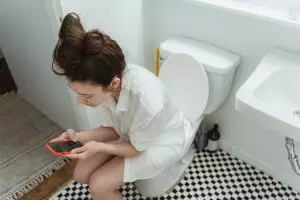
Bladder pain and pressure? Urinary urgency? Pelvic pain that feels like a UTI or bladder infection? Interstitial cystitis is a painful bladder syndrome caused by bladder inflammation. Acupuncture and TCM offer an alternative interstitial cystitis treatment that can help relieve interstitial cystitis symptoms.
Interstitial cystitis is a chronic pain condition that is difficult to diagnose and treat with conventional medicine. It is generally considered a urological or gynecological condition, but actually, men and women can both experience what is sometimes referred to as painful bladder syndrome (IC/PBS) or “frequency-urgency-dysuria syndrome.” Dysuria means “painful urination.”
While interstitial cystitis can be different from person to person, the best way to describe it is feeling like you have the urinary frequency that is characteristic of a UTI or symptoms bladder infection all the time—except that there is no bacterial infection present, so the condition does not get better with antibiotics.
Interstitial cystitis and overactive bladder (OAB) share many of the same signs and symptoms and can sometimes overlap. The primary difference between these two conditions is that interstitial cystitis usually involves pelvic pain in addition to urinary urgency, while overactive bladder involves urinary incontinence, but usually not significant bladder pain.
That feeling of bladder pressure and urinary urgency can really get in the way of your daily activities. People who suffer from interstitial cystitis may feel like they’re going to the bathroom every few minutes all day long. Even though they’re peeing a lot, though, the painful urgency to urinate again returns quickly.
Interstitial cystitis involves irritation and inflammation of the bladder that can ultimately cause a buildup of scar tissue in the bladder and may decrease its capacity to hold urine. There may also be small amounts of blood in the urine (hematuria) due to pinpoint bleeding on the bladder walls.
What Causes Interstitial Cystitis?
Medical science has not yet discovered why some people experience interstitial cystitis (IC). It has been suggested that it may be related to an autoimmune disease attacking the bladder or causing inflammatory cells to develop in the bladder, nerve signals that are causing painful sensations even though nothing is wrong, some type of allergic reaction to chemicals in the urine, or sores developing in the bladder lining.
Some people who suffer from interstitial cystitis may also have IBS, fibromyalgia, migraines, or other chronic pain conditions. There is some evidence that IC is associated with also having an autoimmune condition, such as lupus, rheumatoid arthritis, or a thyroid disorder.
Interstitial cystitis bladder pain is a complex problem with both physical and emotional components. The urgency to pee can become so persistent and painful that it gets in the way of normal life, and even relationships. Fortunately, TCM and acupuncture offer holistic treatment for interstitial cystitis that can help relieve pain and anxiety.
Top 5 Interstitial Cystitis Symptoms
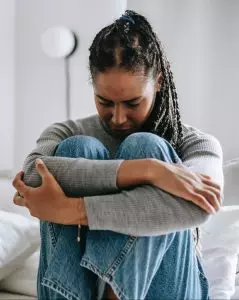
Each person’s experience of interstitial cystitis is unique. For some, the uncomfortable sensations of urinary frequency and bladder pressure may come and go. For others, bladder pain may be constant.
The common symptoms of interstitial cystitis include:
- Urinary frequency, peeing a lot
- Urinary urgency, feeling like you have to pee even when you just went
- Only peeing a small amount when you go
- Bladder pain, bladder pressure, pelvic pain, pain in the perineum
- Pain during sex
Menstruation can cause interstitial cystitis pain to worsen, as can certain foods or drinks, having sex, or sitting for long stretches of time.
Top 10 Triggers of Interstitial Cystitis Pain
People with interstitial cystitis are often advised to keep a record of their eating habits and pay attention to what foods or beverages seem to make their symptoms worse.
Things that may trigger bladder pain include:
- Tomatoes
- Citrus fruits
- Alcohol
- Caffeine – coffee, tea
- Carbonated beverages, soda, pop
- Fruit juice
- Chocolate
- Artificial sweeteners
- Milk and other dairy foods
- Spicy foods
Going on an elimination diet, in which you avoid certain foods for a period of time and see if your symptoms abate, may help.
Interstitial Cystitis Treatment
Medical treatment for interstitial cystitis is focused mainly on mitigating symptoms. Painkillers, antihistamines, and antidepressants are most commonly prescribed to help relieve painful bladder syndrome.
Amitriptyline is approved to treat depression, but is sometimes used to help treat autoimmune-related chronic pain due to fibromyalgia and MS, as well as interstitial cystitis.
Elmiron is a drug specifically approved to help protect the lining of the bladder from irritation. It can take several months for it to start working. It has some serious side effects, including potentially permanent damage to the retinas of the eyes.
Bladder instillations for interstitial cystitis are “cocktails” of medicines that are injected into the bladder with a catheter and held for 15-30 minutes. Treatments may be given weekly or a few times per week over the course of several weeks. Some people get relief from their symptoms with this method. Others may find the catheterization process uncomfortable or painful.
None of these treatments are a cure for interstitial cystitis. TCM and acupuncture offer an alternative treatment for painful bladder syndrome that can relieve pain and address the root cause of the problem.
Can Acupuncture Help Interstitial Cystitis?
According to TCM, the healthy function of the bladder relies heavily on the kidney and spleen, which provide yang energy to warm the bladder. When the Kidney Qi is deficient, the bladder may be too weak to hold urine.
Kidney Qi can be weakened by a long illness, or by repeated UTIs that have not been adequately addressed. It has been noted through medical imaging that prolonged illnesses can cause the bladder to contract in size. It can also become much more sensitive.

Painful urination can begin after someone has a difficult childbirth or other trauma to the pelvic organs. This can have consequences that affect someone both physically and emotionally.
Stagnation of Liver Qi can occur due to a strong emotional upset or depression. The Liver channel moves around and through the pelvis and external genital organs, so when Liver Qi is not moving freely, it can lead to pain or dysfunction in this area. Particularly if Liver Qi has too much heat, it can negatively impact the function of the bladder and pelvic floor area.
To determine what is causing interstitial cystitis pain, an acupuncturist will look carefully at other, seemingly unrelated symptoms that person is experiencing.
For example, if bladder pain is accompanied by fatigue, ear ringing (tinnitus), and cold hands and feet, those are all indicators that Kidney Yang is deficient and cold. Ears are considered to be the opening of the Kidney meridian.
If they are thirsty all the time, have a lot of allergies, warm hands, and tend to feel anxious, these are signs that Kidney Yang is too hot.
An acupuncture treatment protocol will then be developed accordingly to address both the pain and pressure on the bladder, as well as the underlying conditions that are causing imbalances in the organ systems.
Moxibustion treatment and electro-acupuncture may also be used to help relieve bladder pain symptoms.
One study in which patients diagnosed with interstitial cystitis were given one acupuncture treatment per week for four consecutive weeks found that urinary frequency was significantly decreased.
Another study showed that a majority of patients who received weekly acupuncture for three months showed significant improvement or complete relief from urinary symptoms.
Another study suggested that acupuncture treatment may help to relieve bladder irritation and urgency by helping to block nerve impulses around the urethra, the neck of the bladder, and the pelvic floor area.
Acupuncture Near Me for Interstitial Cystitis
Acupuncture is a particularly good modality for helping to treat complicated issues when conventional medicine is not working. Interstitial cystitis is still not well understood by modern science, but TCM methods work well to relieve both physical and emotional pain associated with painful bladder syndrome. If you are experiencing urinary frequency and bladder pressure, but know that you don’t have an infection, please consider giving acupuncture a try.
*This article is for education from the perspective of Traditional Chinese Medicine only. The education provided by this article is not approved by FDA to diagnose, prevent, treat and cure human diseases. It should not stop you from consulting with your physician for your medical conditions. Traditional Chinese Medicine is based on Qi, which is an invisible force that usually cannot be observed by modern science. Because science focuses on testing ideas about the natural world with evidence obtained through observation, these aspects of acupuncture can’t be studied by science. Therefore acupuncture and Chinese herbs are often not supported by double-blind, randomized trials, and they are considered alternative medicine therapies in the United States.